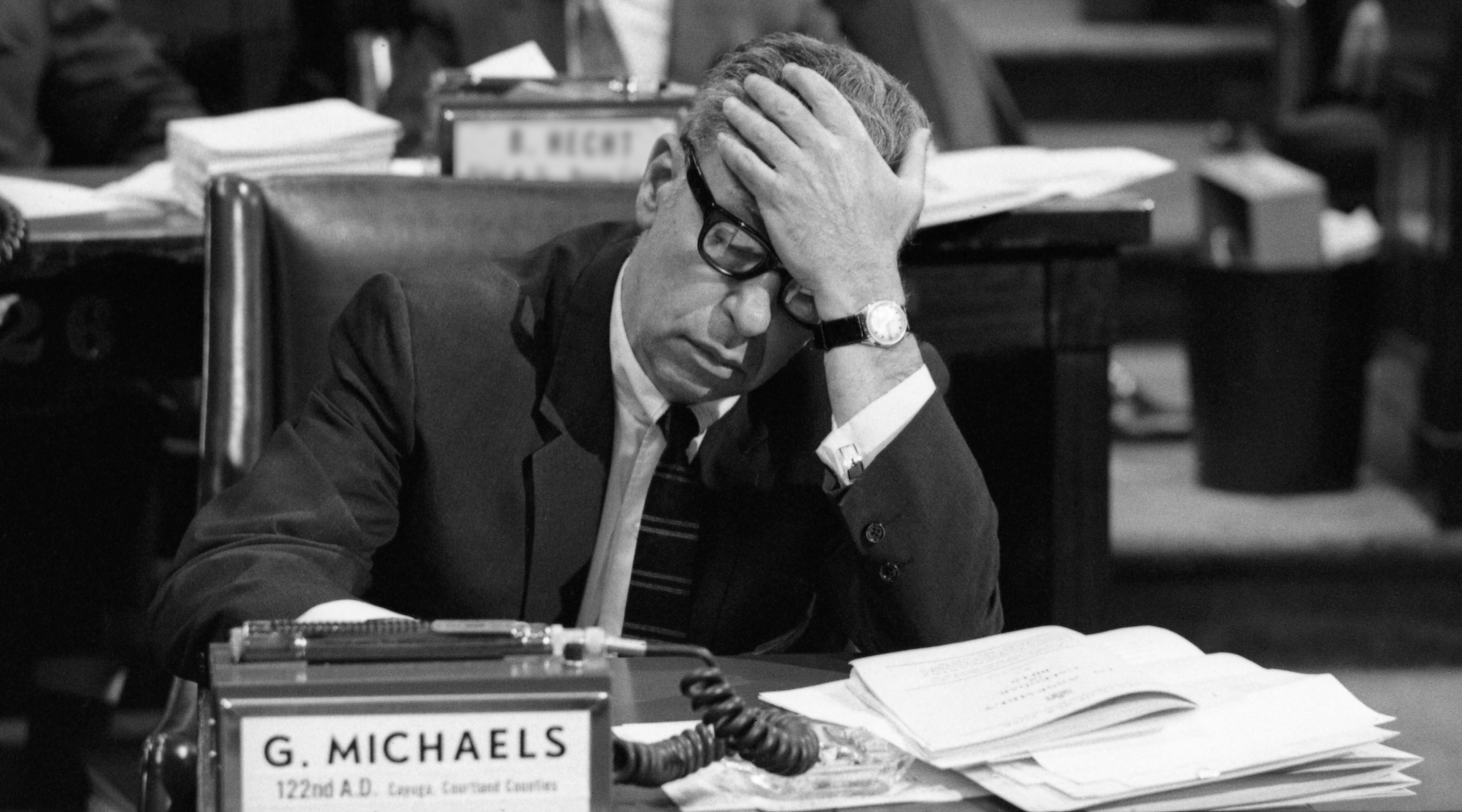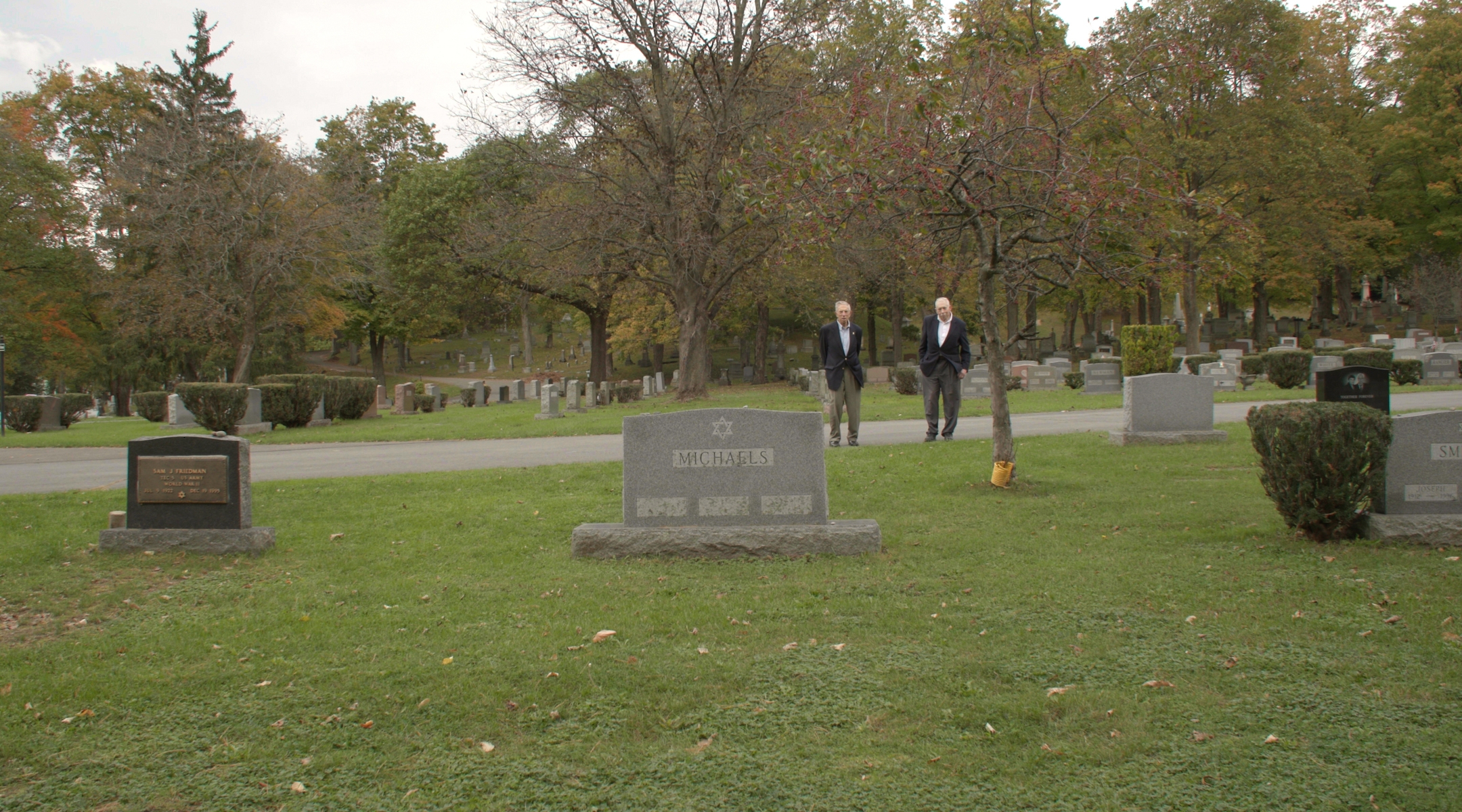A Jewish Democrat gave up his political career to pass New York’s abortion rights law. A new film tells his story.
“Deciding Vote” revisits the legacy of George Michaels, an upstate politician who bucked his conservative district to help make abortion legal

New York State Assemblyman George Michaels (D-Auburn) holds his head after changing his vote to “yes” on a 1970 bill that gave New York the most liberal abortion law in the country, April 9, 1970. (Bettmann Archive/Getty Images)
(New York Jewish Week) — In 1970, New York State passed one of the most expansive abortion rights laws in the country, its legislation putting into motion the eventual adoption of Roe v. Wade in 1973.
But the legislation almost didn’t pass. It was only thanks to George Michaels, a Jewish Democrat in the New York State Assembly, who changed his vote in the 11th hour to allow for the legislation to move forward with an absolute majority and to be signed into law the next day by Governor Nelson Rockefeller.
“Deciding Vote,” a new documentary released by The New Yorker, brings renewed attention to that decisive yet little-remembered moment in American history, one that ultimately cost Michaels his career.
Co-directors Jeremy Workman and Rob Lyons began working on the 20-minute documentary in 2019, nearly three years before the Dobbs decision that overturned Roe v. Wade. While the film does not explicitly address the current moment, Workman said that “the viewer understands that it’s about now even though this happened 50 years ago.”
“They see how one person really can make a difference,” he told the New York Jewish Week about the film, which was released on Nov. 29. “It shows us how, in all our decisions, we can look inward and also to the big picture of the world and see what makes the most sense and not just retreat into our own political corner.”
Michaels, a lawyer, was a State Assembly member from 1961 to 1966 and again from 1969 and 1970. He represented Auburn in New York’s Finger Lakes region — a Jewish Democrat in a heavily Catholic and conservative area.
For much of his tenure, the film relates, Michaels was steadfast in serving his constituency, which overwhelmingly opposed abortion. Even the Jews who lived in his district, Workman said, generally opposed abortion. Although Michaels personally supported a woman’s right to choose, he had twice voted against efforts to expand abortion rights because he knew that his constituents did not.
So, on April 9, 1970, when a bill that had already passed in the Senate arrived in the House that allowed for access to abortions up until 24 weeks of pregnancy, or at any time to protect the life of the mother, Michaels initially voted against it as well.
However, at the end of the session, after he saw that it was deadlocked at 74 in favor and 74 opposed, he stood up to change his vote, knowing that the bill needed an absolute majority of 76 in favor to pass. With the count 75-73, the Speaker of the Assembly, Perry Duryea, who only voted in cases when his vote would make a difference, would be able to cast the deciding vote.
“Many people in my district may not only condemn me for what I’m about to do, but Mr. Speaker, I say to you in all candor, and I say this very feelingly to all of you, what’s the use of getting elected or re-elected if you don’t stand for something?” he said in a speech before he changes his vote.
Michaels knew that this decision would end his time in the State Assembly. “I fully appreciate that this is the termination of my political career,” he said in the same speech. “But I cannot in good conscience stay here and thwart the obvious majority of this house, the members of whom I dearly love, and for whom I have a great deal of affection. I’ll probably never come back here again to share these things with you. I therefore request you, Mr. Speaker, to change my negative vote to an affirmative vote.”
Duryea then voted for the affirmative, and the bill was sent to the governor to sign. As women poured into New York for the procedure, it set the stage for the Roe v. Wade decision in the Supreme Court three years later.
And even though Roe v. Wade was overturned last year, its legacy carries on. Furthermore, New York’s law remains intact, making it one of the safest and easiest states to get an abortion, even allowing for minors from any state to travel to New York to receive abortions without parental consent.
As Michaels’ son James describes it in the film, “Suddenly, all hell broke loose.” Michaels did not receive the Democratic endorsement in the next election, and never won another election after. The Queens, New York native practiced law until his retirement in 1985, and died in 1992 at age 82.
As the story goes, it was his children, who, as young adults in the 1960s were involved in anti-war, civil rights and reproductive rights movements, who convinced him to vote for the bill.
That Michaels listened to his sons and his daughter-in-law is, for Workman, what really stands out about this story — and what makes it Jewish. “For me, his Judaism really comes through with his children,” Workman said. “Jews at that time were very active in all kinds of social justice, reproductive rights, civil rights and voting rights movements.”
In the movie, Michaels’ son James, who is now a rabbi in Maryland, remembers telling his father, “You’re the only hope we have.” He says that the first time he discussed the issue with his father, the elder Michaels told him that he couldn’t vote for the bill.
“I said, ‘I understand, just as long as your vote isn’t the one to defeat it,’” the younger Michaels recalls. “I never dreamed that it would come to the point where that would be where his vote would be the one that was so critical.”

George Michaels’ sons, Lee and Rabbi James Michaels, visit their father’s grave at the Fort Hill Cemetery in Auburn, New York. (Jeremy Workman)
Michaels references his conversation with his son in the speech he gave on Capitol floor to change his vote, which is shown in full in the film.
“Just before I left for Albany this week, my son Jim, who, as you recall Mr. Speaker, gave the invocation to this assembly on February 4th, and he said ‘Dad, for God’s sake. Don’t let your vote be the vote that defeats this bill,’” he says in his speech.
Workman said that while Michaels story isn’t completely unknown, “It just kind of got lost a little to the history books. No one had really pointed George Michaels out and what impact he had.”
The documentary interviews Jewish activist and former Manhattan borough president Ruth Messinger, who has been one of the sole upholders of Michaels’ legacy. She teaches a course on the late lawmaker called “George Michaels and Moral Courage” as part of a leadership course she teaches with the American Jewish World Service and as an adjunct professor at Hunter College.
“Very often, the most organized groups that do the most lobbying, that make the most noise, are groups that actually don’t represent a majority,” she says in the film. “So very often you have to take a quiet conversation with yourself: I know where people stand, but I have to do what I think is right.”
Messinger will speak on a panel about the film at the Marlene Meyerson JCC Manhattan on Dec. 12 with co-director Rob Lyons. The film can be seen at the New Yorker website.
“My concern is that too many of the people who exercise moral courage don’t have a legacy because we don’t talk about them,” Messenger adds. “If you’re looking for a model for doing that — for sticking your neck out, for taking a position of moral courage — Assemblyman George Michaels is right at the top of my list.”
This article originally appeared on JTA.org.
















